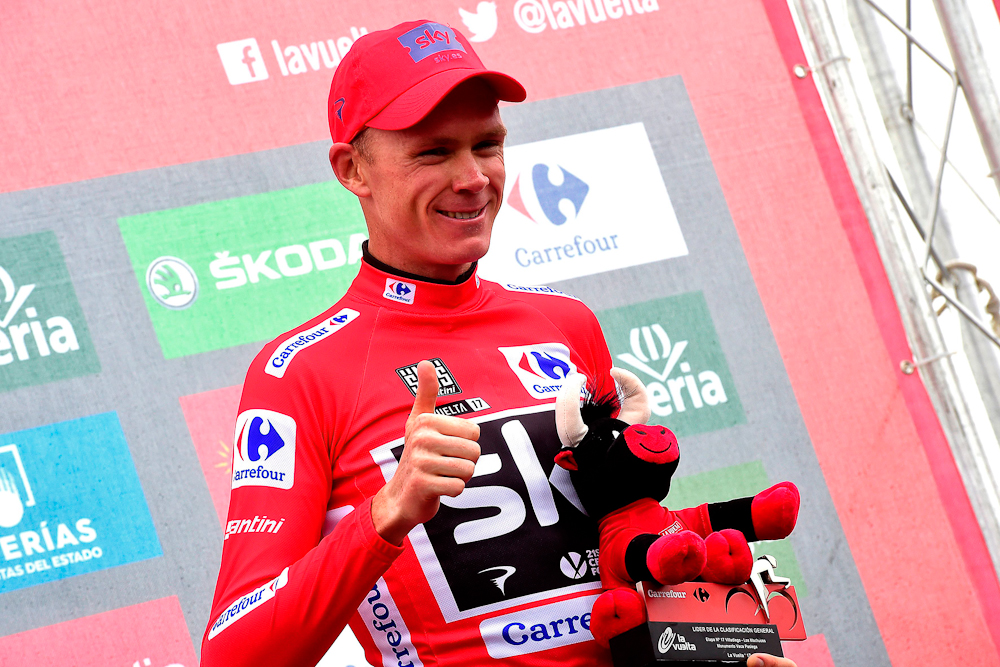Chris Froome salbutamol case sparked fall-out between UCI and WADA
Both organisations accuse the other of shirking responsibility in decision to clear four-time Tour de France winner

Chris Froome’s salbutamol case lead to a fall-out between the UCI and the World Anti-Doping Agency, according to a report published Tuesday by BBC Sport.
Froome, who exceeded the therapeutic threshold for the asthma drug in a test at the 2017 Vuelta a España, was eventually cleared by the UCI of ahead of the 2018 Tour de France.
Subsequent email exchanges between UCI president David Lappartient and WADA’s then president Craig Reedie suggest both organisations were looking to shift responsibility for the case onto the other.
At the time, the UCI said it closed the case "based on WADA’s position". As the sport’s governing body, the UCI runs its own anti-doping programme – formerly via the Cycling Anti-Doping Foundation and now through the International Testing Agency – but its regulations are largely based on the WADA code.
However, as revealed by the BBC, Reedie wrote to Lappartient 10 days after the closure of the case to say it was "disappointing" and "wrong" for the UCI to suggest its hands were tied.
"The UCI was the results management authority with exclusive jurisdiction over the case and all relevant elements at its disposal. If the UCI… disagreed with Wada's position, it was under no obligation to espouse it,” Reedie wrote.
"It is with regret that we have observed apparent attempts on the part of the UCI to divest itself of any responsibility for the decision.”
Get The Leadout Newsletter
The latest race content, interviews, features, reviews and expert buying guides, direct to your inbox!
The BBC reports that Lappartient replied two days later to state that he had concerns over WADA’s regulations surrounding salbutamol but didn’t publicly air them, and adjusted the UCI's case, so as to "protect" WADA.
He expressed disappointment that he didn’t receive the same "public solidarity" in return and suggested the case had damaged his and the UCI’s reputation.
"[The UCI] even accepted Wada's requests to remove elements of the decision which would put Wada in an uncomfortable position. The fact the UCI 'did not attribute [its] decision to any systemic failing' was not because it does not have concerns about your salbutamol regime, but rather because it elected not to air these in a written document sent to an athlete," Lappartient wrote.
“[I was] happy to do that for WADA on the understanding that your organisation would then support the UCI in justifying what, to the public, is a very difficult decision to understand.
“[WADA] appears to be placing full responsibility for the decision squarely on the UCI's shoulders. We both know very well who took the initiative of closing this case and the reasons why. It is disappointing to see that your organisation is not taking responsibility on the ground that technically the decision had to be taken by the UCI."
Froome’s sample from the 2017 Vuelta, which he won, contained double the 2000 ng/mL salbutamol limit. Since salbutamol is a 'specified substance', Froome was not provisionally suspended as the UCI opened proceedings, but the case was leaked in December 2017.
Froome and Team Sky set about attempting to show that anomalies could mean a rider produces a sample that exceeds the limit, without having exceeded the permitted dosage when taking the drug. Athletes can take part in a pharmacokinetic study to test whether any discrepancies could be accounted for, but it was deemed impossible to recreate the conditions in which Froome gave his sample during the final week of the Vuelta.
Lappartient cited the absence of a pharmacokinetic study in expressing concern over the “objective difficulty in explaining how the Wada salbutamol regime can allow an athlete with a concentration of 2000ng/ml to be absolved.”
Froome, who has always denied wrongdoing, did not comment directly but his lawyers issued a statement to the BBC.
"It seems that the UCI had concerns about Wada's salbutamol regime. It would be fairer to athletes if those concerns were tackled, rather than allowing the regime to continue in its current form simply to save Wada from embarrassment and potential legal liability from innocent athletes who have been wrongly prosecuted.
"Mr Froome hopes that the UCI and Wada have been working to improve the salbutamol regime and to reduce the risk of innocent athletes being wrongly accused of falling foul of it."
Cyclingnews is the world's leader in English-language coverage of professional cycling. Started in 1995 by University of Newcastle professor Bill Mitchell, the site was one of the first to provide breaking news and results over the internet in English. The site was purchased by Knapp Communications in 1999, and owner Gerard Knapp built it into the definitive voice of pro cycling. Since then, major publishing house Future PLC has owned the site and expanded it to include top features, news, results, photos and tech reporting. The site continues to be the most comprehensive and authoritative English voice in professional cycling.